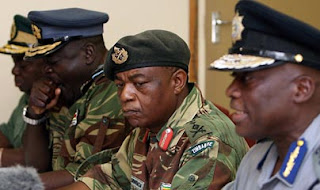PAST & FUTURE OF ZIMBABWE
Made said critics are ignoring Zimbabwe’s reality. “We
were a conquered people and our land was taken,” he stated. “Naturally, we had
to fight and we won an armed struggle to the right to reoccupy our land.” Initially,
Britain and the U.S. had agreed to compensate displaced white farmers as part
of the 1979 Lancaster House Agreement that brought independence to what would
later become Zimbabwe. Once the farmers were not paid, the blame was shifted to
the Mugabe government, not the countries that reneged on their pledges. “We
will not compensate for land that was never paid for,” Made said. “That land
was taken by virtue of conquest – our forefathers were not given money. That
[compensation] is the responsibility of the British.”
Made said most of the world minimizes the suffering
Blacks experiences under White minority rule. He said:“There’s all the talk
about democracy, but we are the people who were denied the right to vote. We
are the people who were told, ‘You don’t come through the front door, you go
through that rear door.’ That was the system that operated here. “We could not
sit on the same bench with a White person in a park. The Black workers could
not go on the same lift [elevator] as White people. It was in this city where
you could not walk on the pavement – you had to walk where the cars were
driving – as a Black person. “We fought and on the day of independence, the
Black people walked on the pavement en masse. That’s how the law was repealed.”
Skyscrapers that dot downtown Harare are
rusty reminders of a gleaming city of a bygone era. An car trip from the
airport to the center city is a bumpy one because of deep potholes. Even the
sidewalks, now that Blacks can walk on them, are in desperate need of repair. President
Mugabe said international sanctions have taken a toll on the country. But
Ambassador Wharton said some of the wounds were self-inflicted. “One of the
things I hear Zimbabweans say is Zimbabwe never did anything wrong,” he
recounted.
“In fact, I think there were some
mistakes. Wharton said one was the decision to in 1997 to make large payments
to veterans of the liberation struggle. “I’m not saying that was right or
wrong, but when they did that, the currency blew up,” he said. “I think they
made a mistake in 1999 when they walked away from their debts to the IMF
[International Monetary Fund] – they just stopped servicing those debts. That
cut them off from new credit and debt relief.”
In addition, Zimbabwe can’t borrow from
the World Bank or the African Development Bank because it stopped servicing
those debts as well. The Reserve Bank of Zimbabwe printed extra money to
satisfy growing government debts, causing the inflation rate to soar from 32
percent in 1998 to an astonishing 11,200,000 percent by 2007. Following a
decade of economic contraction, the economy grew by 6 percent in 2011 and
slipped to 5 percent in 2012. After a hotly contested presidential election in
2008, Mugabe entered into a power-sharing agreement with his chief political
opponent, Morgan Tsvangirai, who became prime minister. Pressure is mounting on
both to make sure the next election is a fair one.
Some businessmen, such as Elzie L.
Higginbottom, president and CEO of Eastlake Management Group, Inc. in Chicago,
see enormous investment opportunities in the country. “When Zimbabwe was known
as Rhodesia, it was the breadbasket of southern Africa. I like the size of the
country – about 12 million people. I like the fact that it is an English-speaking
country,” said Higginbottom, who has been traveling to Zimbabwe for the past
four years. “The education level is very high – a 93 or 94 percent literacy
rate. The other thing I like is that they have a basket of currency, but the
predominant currency is the U.S. dollar.”
He added, “Zimbabwe is a mineral-rich
country. It has platinum, gold, diamonds, chrome – it has all sorts of valuable
minerals. It’s a peaceful country, it is predominantly one tribe and it’s set
for redevelopment and improvement.”
Despite the sanctions, the U.S. maintains
diplomatic relations with Zimbabwe. Trade between the two countries has grown
from approximately $100 million to $160 million annually over the past three
years. Ambassador Wharton, who says his goal is to see all sanctions on
Zimbabwe lifted, predicts that investors will eventually flood the country. “The
country has extraordinary intellectual capital,” he said. “Robert Mugabe
invested very well in education and health from the very beginning, from 1980
forward and the result is that you got an extraordinarily well-educated
population – the highest literacy rate in sub-Saharan Africa. Culturally,
Zimbabweans work hard, they’re honest, they’re ethical – they are extraordinary
people. “On top of that you got great mineral wealth – gold, platinum, chrome,
diamonds, coal – and you got fantastic agricultural potential, which is
currently underutilized. This country used to feed the entire region. You
harness that intellectual capital with those natural resources and it’s in an
extraordinarily attractive position for economic growth.”


Comments